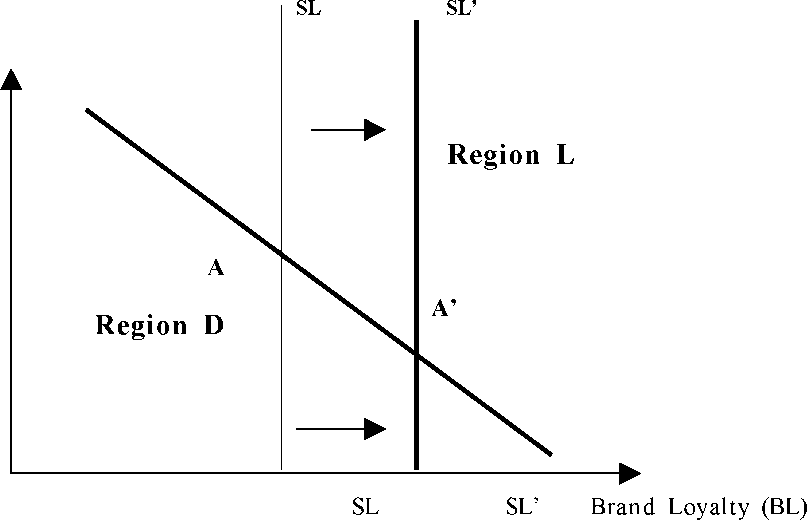Proposition 2: Rational retailers optimizing shelf- space allocation will be more likely to
replace second- tier manufacturer brands with private labels because these brands can
be delisted and the margins retailers obtain on secondary brands are lower than those
on tertiary- tier or fringe brands.
What happens if over time the higher quality of store brands results in an increase of
store loyalty? A well defined stylized fact, as we have seen in section 2, is that private
label positioning tends to change over time. Today private labels are increasingly able
to provide the quality once exclusively associated with higher quality premium brands.
As a consequence, they are more likely to compete with the market leader as well. This
notion of store brand evolution has relevant implications which our framework allows
to analyse very easily.
The consequences of a higher level of store loyalty are illustrated in Fig. 3. The initial
equilibrium is given by point A. An increase in the degree of store loyalty, for example
as a consequence of more sophisticated store brands, which is illustrated by a shift
outward of the line from SL to SL’, changes
the equilibrium into A’. As a consequence, the region of delisting (region D) become
larger whereas region L narrows. The new equilibrium implies that a certain number of
Retailer
margin

Fig. 3 The delisting mechanism
and the increase of store loyalty
17
More intriguing information
1. CHANGING PRICES, CHANGING CIGARETTE CONSUMPTION2. The name is absent
3. AN EXPLORATION OF THE NEED FOR AND COST OF SELECTED TRADE FACILITATION MEASURES IN ASIA AND THE PACIFIC IN THE CONTEXT OF THE WTO NEGOTIATIONS
4. On the Existence of the Moments of the Asymptotic Trace Statistic
5. A methodological approach in order to support decision-makers when defining Mobility and Transportation Politics
6. Credit Market Competition and Capital Regulation
7. The name is absent
8. The name is absent
9. The name is absent
10. L'organisation en réseau comme forme « indéterminée »